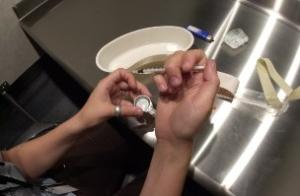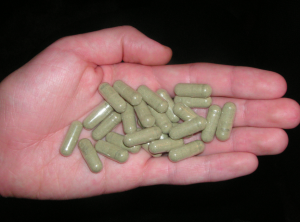Election Day saw the number of states with marijuana legalization double, and the number of people living in legalization states quadruple. But there won't be more ballot initiatives until 2018 at the earliest. Reformers are eyeing five states where legalizing marijuana through the legislature may be possible.
Donald Trump doesn't appear overly concerned with the mass killings and human rights violations taking place in the Philippines' drug war.
Advocates file a petition to rein in DEA misinformation about medical marijuana, Arkansas regulators are moving to implement the new law there, Minnesota adds PTSD, and more.
A bunch of Des Moines drug cases are now in doubt after a pair of cops are accused of planting drugs, a former New York cop gets sent away for selling "date rape" drugs, and more.
Foes challenging the narrow legalization victory in Maine got their recount going today, patients take to the courts in Arizona and to the streets in Michigan, Seattle health care professionals do a die-in for safe injection sites, Ireland takes another step toward medical marijuana, and more.
Medical marijuana advocates want the DEA to quit fibbing about weed, Massachusetts pols say they may delay implementation of legal pot commerce, a medical marijuana bill gets filed in Texas, and more.
An organic foods group says allowing kratom would be "dangerous," the Drug Policy Alliance comes out with a plan for heroin and prescription opioids, Iowa shuts down its asset forfeiture unit, and more.
This article as produced in collaboration with AlterNet and first appeared here.
Four states, including California, the nation's most populous, voted to legalize marijuana on November 8. That doubles the number of legal states to eight (plus the District of Columbia), and more than quadruples the number of people living in legal marijuana states, bringing the number to something around 64 million.
Every one of those states legalized marijuana through the initiative process, but we're not going to see any more initiatives on state ballots until 2018, and perhaps 2020. That means that if we are to make more progress on spreading marijuana legalization in the next couple of years, it's going to have to come at the state house instead of the ballot box.

Rhode Island State Capitol
That's the same pattern we saw with medical marijuana. California led the way via the initiative process in 1996, with several other states following in 1998 and 2000 before Hawaii became the first state to okay medical marijuana via the state legislature.
The election of Donald Trump is causing great uncertainty about the future of legal marijuana, and will act as a drag on legislators until his stance is clarified. Just as governors hesitated to implement medical marijuana programs in the face of federal hostility a decade ago, legislators will hesitate to move toward legalization in the face of uncertainty, or worse, outright hostility from a Trump administration.
Still, efforts to legalize marijuana through the legislative process have been underway for several years in a handful of states and have already come close to passage in some of them. And now, especially in New England, the pressure of neighboring states having already embraced legalization is fueling legalization fervor. But it's not just New England. The marijuana legalization message is resonating across the land.
Getting a bill through a state legislature is a long, multi-stage process, with too many opportunities for getting derailed, from obstinate committee chairs to skeptical governors wielding the veto pen. Despite the obstacles, here are five states that could get it done before the 2018 mid-terms:
Connecticut
Connecticut already has medical marijuana and decriminalized possession in 2011 with the support of Gov. Dannel Malloy (D). Malloy had said that decriminalization was as far as he wanted to go, but he's hinting at changing his tune after marijuana's big victory on Election Day. "We might have to reexamine our legal position, our position of enforcement, based on what some surrounding states are doing," Malloy said three days later.
For veteran legislators such as state Reps. Juan Candelaria (D-New Haven) and Toni Walker (D-New Haven), Malloy's softening couldn't come soon enough. They've authored legalization bills in past sessions, but they haven't gotten much traction. Look for them to be back at it again next year, with the changed New England political landscape smoothing the road.
Maryland
Maryland approved medical marijuana in 2014 (although the long-delayed program has yet to see any actual dispensaries open) and decriminalization last year under then Democratic Gov. Martin O'Malley.
The bad news is that O'Malley is gone now, replaced by anti-marijuana Republican Gov. Larry Hogan. The good news is that the legislature has already demonstrated a willingness to override Hogan's vetoes when it comes to pot policy; it did that this year with a housekeeping bill that decriminalized the possession of paraphernalia (an oversight in the 2015 decriminalization bill).
Reform-minded legislators last year filed a legalization bill, the Marijuana Control and Revenue Act of 2015, in both houses, but they were stymied by unfriendly committee chairs. They're going to be back next year, backed by a carefully-built coalition of drug reform, social justice, and public health groups -- and with the support of a healthy majority of Marylanders, according to recent polls.
New Mexico

New Mexico Legislative Chambers
Eyeing next door neighbor Colorado, New Mexico is another state ripe for marijuana legalization. Two polls this year had popular support for legalization at
61%, and Democrats have now won control of the state legislature. That means two different moves toward legalization could occur: Rep. Bill
McCamley (D-Mesilla Park) has filed a legalization bill the last two years, and
says he will do it again next year. "It's not an academic exercise anymore," he said. And Sen. Jerry Ortiz y
Pino (D-Albuquerque) also says he will be introducing a constitutional amendment that would take the issue to a popular vote.
But like Maryland, legalizers face an anti-marijuana Republican governor in Susana Martinez. Either Martinez is going to have to have a pot epiphany or the legislature is going to have to have enough votes to override a probable veto.
Rhode Island
This may be the best prospect of the bunch. Medical marijuana is well-established in the state, decriminalization has been in effect for four years, and now, in the wake of the legalization victory in neighboring Massachusetts, Gov. Gina Raimundo (D) says she's ready to more seriously consider doing the same in Rhode Island, although she has concerns about public safety and how any legislation is drafted.
Democrats control both houses of the legislature, and both House Speaker Thomas Mattiello and Senate Majority Leader Dominick Ruggerio say they are ready to take up legalization bills. That would be a pleasant change: For the past six years, legalization bills have been filed, but never voted on.
Rhode Island's political leaders finally look ready to catch up to their constituents, 55% of whom supported legalization in a recent poll from Brown University and who smoke pot at the highest rate of any state, reporting a 16% past month use rate.
Vermont
Vermont very nearly became the first state to legalize weed through the legislative process this year. A legalization bill, S. 241, was supported by Gov. Peter Shumlin (D) and passed with strong support in the Senate, only to die in the House.
Now, a pair of key lawmakers said they are ready to try to get legalization through the legislature again. Sen. Dick Sears, chairman of the Senate Judiciary Committee, said legalization votes in Maine and Massachusetts are forcing the state's hand. "For me, that's a game-changer, that Massachusetts has voted to legalize," Sears said.
Sears' counterpart in the House, Judiciary Committee chairwoman Rep. Maxine Grad, is also ready to go, saying the Maine and Massachusetts votes will make lawmakers more amenable to moving forward.
There's just one problem: Shumlin is gone now, replaced by incoming Republican Gov. Phil Scott, who is not a big fan of government regulation, but is not a big fan of marijuana legalization, either. "I can appreciate the discussion around ending the prohibition of marijuana," he said, but had many, many concerns about this year's bill. Still, it's possible legislators will have heard those concerns and will come up with a bill that Scott can live with -- or a majority that can override a veto.
back to top
Donald Trump's seat-of-the-pants pre-inaugural telephone diplomacy is causing shock waves in diplomatic circles and world capitals around the globe, whether it's getting all buddy-buddy with despots like Kazakhstan's perpetual leader Nursultan Nazarbayev, throwing US China policy into turmoil by taking a call from the president of Taiwan, or insulting close allies like Great Britain by failing to reach out in a timely fashion.

Filipino strongman Rodrigo Duterte (Creative Commons/Wikimedia)
Duterte's bloody campaign has drawn scathing criticism from human rights groups, the United Nations, and the Obama administration, with Duterte responding to the latter by calling Obama a "son of a whore." But in his phone call with Duterte, Trump was singing a different tune.
Duterte said Saturday that Trump had endorsed his bloody anti-drug campaign, telling him that the Philippines was doing it "the right way" and that Trump was "quite sensitive" to "our worry about drugs."
"He wishes me well, too, in my campaign, and he said that, well, we are doing it as a sovereign nation, the right way," Duterte said.
In a Philippines government summary of the call between Trump and Duterte, the Filipino president said the pair had spoken only briefly, but touched on many topics, including the anti-drug campaign.
"I could sense a good rapport, an animated President-elect Trump, and he was wishing me success in my campaign against the drug problem," Duterte said. "He understood the way we are handling it, and I said that there's nothing wrong in protecting a country. It was a bit very encouraging in the sense that I supposed that what he really wanted to say was that we would be the last to interfere in the affairs of your own country. I appreciate the response that I got from President-elect Trump, and I would like to wish him success," Duterte said. "He will be a good president for the United States of America."
The Trump team has yet to comment on the call.
Duterte, who rose to national political prominence as the death squad-supporting mayor of Davao City, is among the most brutal of the crop of right-populist political leaders and movements that have emerged around the globe this year, but delicacies like concern about human rights or the lives of drug users don't appear to be on Trump's radar. Especially when he's got more pressing concerns in the Philippines -- such as the Trump-branded residential tower going up in metropolitan Manila. Duterte has just named he Filipino businessman who is Trump's partner in the project, Jose E. B. Antonio, to be a special envoy to the US.
While Trump is seemingly brushing aside human rights concerns about the mass drug war killings raised by the Obama administration, even the administration's protests are undercut somewhat by continued US financial assistance to the Philippines National Police units that are heavily involved.
While the US has suspended weapons sales over the issue, as BuzzFeed News reported, despite US statements of concern the State Department continues to send millions of dollars in aid to the Philippines National Police. The Obama administration requested $9 million in aid for anti-drug and law enforcement programs for this year. The State Department says the funds are no longer being used for anti-drug training, but funds continue to go to the police.
The State Department also said that police units found to be involved in extrajudicial killings would not get US assistance, but BuzzFeed News found that "officers at police stations receiving support from the US have played a central role in Duterte's bloody campaign. By comparing Philippine police data with internal State Department records, it is clear that many of the stations -- especially those in the capital city of Manila -- are collectively responsible for hundreds of deaths."
The continued State Department funding of police linked to the drug war killings itself subverts the Obama administration's rhetoric of concern about Duterte's bloody crusade. But if Trump's first chat with Duterte is any indication, even rhetorical concern about human rights in the Filipino drug war is about to go out the window.
back to top
Advocates file a petition to rein in DEA misinformation about medical marijuana, Arkansas regulators are moving to implement the new law there, Minnesota adds PTSD, and more.
NationalOn Monday, ASA filed a petition with the DOJ to make DEA stop lying about marijuana. Americans for Safe Access (ASA) filed a petition under the Information Quality Act with the Justice Department "demanding that the Drug Enforcement Administration (DEA) immediately update misinformation about cannabis." Under the Information Quality Act, federal administrative agencies are required to ensure that the information they disseminate is accurate and objective. ASA says the DEA has violated the act at least 25 times.
Arizona
Last Friday, a pair of patients sued the state over fees. Attorneys for patients Yolanda Daniels and Lisa Becker filed suit last Friday to force a reduction in the annual fee for registration cards that patients are legally required to obtain. The state health department is charging $150 a year, even though it has nearly $11.5 million in its medical marijuana account. "In a time when medication is more expensive than ever, the state should be helping to make it cheaper for Arizonans," the patients' attorney argued. "The state is deliberately squatting on the excess fund instead of refunding it to patients or using it in furtherance of the Arizona Medical Marijuana Act, such as to help patients."
Arkansas
Last Wednesday, regulators released draft medical marijuana rules. The state Department of Health Wednesday released proposed draft rules for the voter-approved medical marijuana program. The rules include provisions about labeling, obtaining medical marijuana registry cards, lab testing requirements, and the process for adding new qualifying conditions. The department said it hopes to present the draft rules to the Board of Health next month and then open them to public comment. The department has not completed draft rules for regulation of and applications for dispensary and cultivation licenses. The state is supposed to be ready to license growers and sellers by June 1.
Michigan
Last Friday, protestors gathered to denounce Kent County dispensary raids. A couple of dozen people gathered outside the Plainfield Township Hall last Friday to protest a series of raids last Monday that shuttered three dispensaries in Plainfield. Demonstrators said they have nowhere to go to get their medicine, but Plainfield officials countered that dispensaries had been banned there since 2011.
Minnesota
Last Thursday, Minnesota okayed medical marijuana for PTSD. The state Department of Health has decided to add post-traumatic stress disorder (PTSD) to the list of qualifying conditions for marijuana. It had been weighing requests to add PTSD, autism, arthritis, depression, and other conditions. "While the process of reviewing these potential additions was difficult due to the relative lack of published scientific evidence, PTSD presented the strongest case for potential benefits," Health Commissioner Dr. Ed Ehlinger said. "PTSD also has few effective treatment alternatives available for some patients with the condition," he added. The decision means that patients certified with PTSD will be eligible for medical cannabis starting August 2017.
Texas
On Tuesday, a lawmaker filed a medical marijuana bill. State Sen. Jose Menendez (D-San Antonio) Tuesday filed a bill to allow for the use of medical marijuana in the Lone Star State. The bill lists qualifying conditions and would allow for private dispensaries, but would not set amount limits. Menendez said that should be left between the doctor and the patient. The bill is not yet available on the state legislative website.
[For extensive information about the medical marijuana debate, presented in a neutral format, visit MedicalMarijuana.ProCon.org.]
back to top
A bunch of Des Moines drug cases are now in doubt after a pair of cops are accused of planting drugs, a former New York cop gets sent away for selling "date rape" drugs, and more. Let's get to it:
In Des Moines, Iowa, two Des Moines police officers resigned Monday after officials accused them of planting evidence in a drug case last year. Senior Police Officers Joshua Judge, 30, and Tyson Teut, 30, left the force after superiors began investigating a complaint in a January 2015 case. But an internal investigation will review the hundreds of cases the pair worked since the both joined the department in August 2013. Stay tuned; criminal charges could be coming.In St. Croix, the US Virgin Islands, an officer on the governor's security detail pleaded guilty last Thursday to using his law enforcement credentials to bypass TSA screening before he was later caught carrying about 40 pounds worth of cocaine onto a flight bound for Florida. Neal Chesterfield, 39, copped to possession with intent to distribute cocaine and faces an April sentencing date.
In New York City, a former Sleepy Hollow police officer was sentenced last Friday to eight years in prison for selling over a million dollars worth of an illegal analogue of GHB, widely described as a "date rape drug." Robert Smutek, 52, who had also served on a drug task force, also must forfeit $1.2 million in proceeds from the scheme.
back to top
Foes challenging the narrow legalization victory in Maine got their recount going today, patients take to the courts in Arizona and to the streets in Michigan, Seattle health care professionals do a die-in for safe injection sites, Ireland takes another step toward medical marijuana, and more.

Vancouver's safe injection site. Doctors and nurses in Seattle are agitating for something similar there. (vcha.ca)
Maine Legalization Initiative Recount Begins. The Question 1 initiative legalizing marijuana won by less than 1% of the popular vote, garnering 381,692 votes to the opposition's 377,619 votes, a difference of 4,073 votes. Citing the narrow margin of victory, foes called a recount, and it began Monday. The recount could take up to a month, delaying putting legalization into effect until it is completed.
Medical Marijuana
Pair of Arizona Patients Sue Over Fees. Attorneys for patients Yolanda Daniels and Lisa Becker filed suit last Friday to force a reduction in the annual fee for registration cards that patients are legally required to obtain. The state health department is charging $150 a year, even though it has nearly $11.5 million in its medical marijuana account. "In a time when medication is more expensive than ever, the state should be helping to make it cheaper for Arizonans," the patients' attorney argued. "The state is deliberately squatting on the excess fund instead of refunding it to patients or using it in furtherance of the Arizona Medical Marijuana Act, such as to help patients."
Michigan Protestors Denounce Kent County Dispensary Raids. A couple of dozen people gathered outside the Plainfield Township Hall last Friday to protest a series of raids last Monday that shuttered three dispensaries in Plainfield. Demonstrators said they have nowhere to go to get their medicine, but Plainfield officials countered that dispensaries had been banned there since 2011.
Harm Reduction
Seattle Nurses, Doctors Do Die-In at City Hall in Protest Calling for Safe Injection Sites. As Seattle officials ponder whether to move toward allowing a safe injection site, doctors and nurses are turning up the heat. Last Friday, more than 30 members of Health Care Workers for Supervised Consumption Spaces held a die-in at City Hall to imitate the corpses that will be created if safe injection sites aren't allowed. City officials have been generally sympathetic to the idea, and a Seattle/King County opioid task force recommended the move in September.
International
British Town to Allow Drug Testing at Clubs. In a harm reduction first for the United Kingdom, a town in Lancashire will be the first in the country to offer testing of drug samples provided by club-goers at night clubs. The tests will examine samples of cocaine and MDMA to test the strength and purity of the drugs in a bid to reduce deaths related to "adulterated or highly potent" drugs. The National Police Chief's Council reportedly said the scheme could be useful but was still not yet endorsed on a national basis.
Ireland Takes Another Step Toward Medical Marijuana. The Dáil Ãireann, the lower house of parliament, last Thursday approved an amendment allowing for the medicinal use of marijuana. But the measure still has to undergo another round of approval before it becomes law.
Poll: More Irish Support Marijuana Legalization Than Not. As the parliament ponders medical marijuana, a new poll finds that more Irish than not support full-blown legalization. A poll asking "Should cannabis be legalized for recreational use?" had 48% saying yes, 41% saying no, and 11% undecided.
back to top
Medical marijuana advocates want the DEA to quit fibbing about weed, Massachusetts pols say they may delay implementation of legal pot commerce, a medical marijuana bill gets filed in Texas, and more.

DEA marijuana prosecutions are trending down. (dea.gov)
California Roadside Drug Testing Bill Filed. After being defeated last session over concerns that field drug testing devices are not reliable, Assemblyman Tom Lackey (R-Palmdale) is back with a new roadside drug testing bill for the next session, Assembly Bill 6. Lackey says it's all about pot: "The ballot initiative passed this year to legalize marijuana will result in more marijuana consumers on our state's highways and roads," Lackey said in a statement. "It is imperative that we invest in a broad spectrum of technologies and research to best identify marijuana-impaired drivers."
Massachusetts Senate President Says Legal Marijuana Commerce Could Be Delayed. The successful Question 4 marijuana legalization initiative means pot possession, use, and home cultivation is legal as of December 15 and authorizes stores to start selling it in January 2018, but now, key legislators are saying that might not happen on time. Senate President Stan Rosenberg (D) said Monday there is "a strong feeling that we ought to be looking at the later dates, rather than the earlier dates."
Medical Marijuana
ASA Files Petition With DOJ to Make DEA Stop Lying About Marijuana. Americans for Safe Access (ASA) Monday filed a petition under the Information Quality Act with the Justice Department "demanding that the Drug Enforcement Administration (DEA) immediately update misinformation about cannabis." Under the Information Quality Act, federal administrative agencies are required to ensure that the information they disseminate is accurate and objective. ASA says the DEA has violated the act at least 25 times.
Texas Lawmaker Files Medical Marijuana Bill. State Sen. Jose Menendez (D-San Antonio) Tuesday filed a bill to allow for the use of medical marijuana in the Lonestar State. The bill lists qualifying conditions and would allow for private dispensaries, but would not set amount limits. Menendez said that should be left between the doctor and the patient. The bill is not yet available on the state legislative website.
Law Enforcement
DEA Releases 2016 Drug Threat Assessment. The DEA has released its 2016 National Drug Threat Assessment, which emphasizes issues around the use of prescription opioids and heroin and warns about rising opioid overdose rates. The assessment also notes that DEA marijuana prosecutions are declining, but that more of the cases that are prosecuted are domestic, as opposed to Mexican marijuana imports. The assessment also reports declines in Mexican marijuana seizures in every border district but one.
back to top
An organic foods group says allowing kratom would be "dangerous," the Drug Policy Alliance comes out with a plan for heroin and prescription opioids, Iowa shuts down its asset forfeiture unit, and more.

The Natural Products Association says allowing kratom would be "dangerous." (Creative Commons/Wikimedia)
Virginia Marijuana Arrests Plummet. Marijuana arrests have dropped 14% in the state over the past two years, the largest decline this century, and they appear headed for further declines this year. Changes in prosecutorial priorities appear to be behind the fall, with some prosecutors saying they need to husband their resources for felony prosecutions.
Heroin and Prescription Opioids
Drug Policy Alliance Releases Public Health and Safety Plan to Address Problematic Opioid Use and Overdose. The Drug Policy Alliance, the nation's leading proponent of drug policy reform, is releasing a plan to address increasing rates of opioid use and overdose (now the leading cause of accidental death in the United States). The plan marks a radical departure from the punitive responses that characterize much of US drug policy and instead focuses on scientifically proven harm reduction and public health interventions that can improve treatment outcomes and reduce the negative consequences of opioid misuse, such as transmission of infectious diseases and overdose. The plan has 20 specific recommendations, including establishing safe injection sites, moving ahead with prescription heroin (heroin-assisted treatment), and embracing Law Enforcement Assisted Diversion (LEAD) to keep people out of the criminal justice system and bring them in contact with social services.
Kratom
Natural Products Association Says Allowing Kratom Would Be "Dangerous." The largest trade group representing the organic and natural foods industry and dietary supplements makers has commented on the DEA's proposed ban on kratom, saying that "adding kratom to the US food supply could likely be dangerous and lead to serious unintended consequences." Kratom products have not met the strict standards for new items to be marketed to the public or undergone FDA approval, the group said. "Adding an untested and unregulated substance such as kratom to our food supply without the application of longstanding federal rules and guidelines would not only be illegal," said Daniel Fabricant, PhD, NPA's CEO and executive director. "It could likely be dangerous, leading to serious unintended consequences as our nation struggles with the crisis of opioid addiction."
Asset Forfeiture
Iowa Disbands State Asset Forfeiture Team, Returns $60,000 Taken From Travelers. Under increasing fire over asset forfeiture practices that saw a thousand seizures a year, the state Attorney General's Office announced Monday that the Department of Public Safety had disbanded its Interstate 80 drug interdiction and forfeiture team. The move came because of increased personnel demands and the need to focus on reducing traffic deaths, the office said, and had nothing to do with the recently announced settlement of a lawsuit brought by a pair of California gamblers who had $100,000 seized after they were stopped and a small amount of marijuana was found. That settlement resulted in the men getting most of their money back.
Law Enforcement
Justice Department Probing Possible Criminal Charges Over Atlanta DEA Informants. A DEA official told a congressional committee last week that the agency has referred "potential criminal charges" to the Justice Department over an Atlanta DEA supervisor who allegedly was in sexual relationships with two informants, one of whom was paid $212,000 for helping to bust four St. Louis drug traffickers. There are allegations of false documentation of payments to the snitch, who got $2,500 a month for two years, along with two "bonuses" of $55,000 and $80,750. The monthly payments apparently covered the rent for apartment near the DEA supervisor's home in the Atlanta metro area.
back to top







